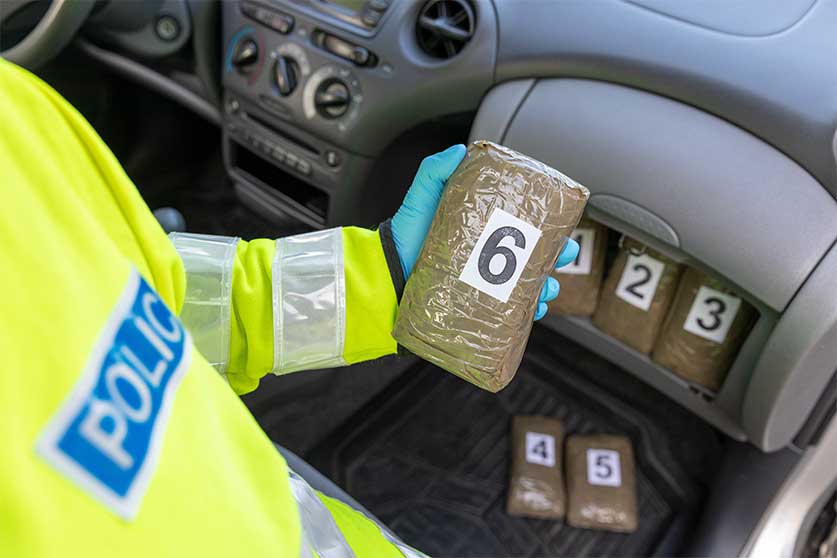Millions Of Deadly Fentanyl Doses Seized In Ohio & Michigan

Medically Reviewed By: Kimberly Langdon, M.D.
Fentanyl is a synthetic (human-made) opioid that’s up to 100 times stronger than morphine. It’s been linked to numerous fatal overdoses. In October 2022, law enforcement officers in Ohio and Michigan seized enough fentanyl to kill over 4 million people.

Fentanyl is a controlled substance linked to numerous drug overdose deaths. As a synthetic opioid, it’s up to 100 times stronger than the opiate (natural opioid) morphine.
Throughout the opioid epidemic, fentanyl has often appeared on the illicit drug market. Recently, law enforcement officers in Ohio and Michigan seized enough fentanyl to cause over 4 million overdose deaths.
Deadly Fentanyl Doses Seized In Ohio & Michigan
Although fentanyl is extremely powerful, it’s relatively cheap to make. That’s why many drug traffickers secretly add it to illicit drugs like heroin, cocaine, and methamphetamine. They may also use it to make counterfeit pills resembling popular prescription drugs like oxycodone.
Between May 23rd and September 8th 2022, U.S. Drug Enforcement Administration (DEA) officers in Ohio and Michigan seized over 65 kilograms of fentanyl powder and 88,000 fentanyl-laced pills.
According to a press release from the United States Department of Justice, this amount of fentanyl could kill 4.7 million people.
Millions Of Fentanyl Pills In The U.S.
During the same time period, law enforcement officers across the country seized about 980 pounds of fentanyl powder and 10.2 million fentanyl pills. This amount could cause over 36 million fatal drug poisonings.
Rainbow Fentanyl
Some of the seized fentanyl was rainbow fentanyl. The term rainbow fentanyl refers to brightly colored pills and powders meant to attract young people. It’s often sold on social media.
How To Protect Yourself From Fentanyl
To reduce your or your loved one’s risk of fentanyl-related death, you should:
Know What To Do In Case Of A Fentanyl Overdose
According to the Centers for Disease Control and Prevention (CDC), the most common symptoms of a fentanyl overdose include:
- slowed breathing
- slowed heartbeat
- limp body
- smaller pupils
- cold, clammy skin
- bluish lips and/or fingernails
- loss of consciousness
If you or someone you know experiences these symptoms, call 911 right away. Also, administer naloxone if you have it.
Naloxone (brand name Narcan) is a medication that can rapidly reverse the effects of an opioid overdose. You can get it at most pharmacies without a prescription. Your pharmacist or healthcare provider can teach you how to use it.
Seek Addiction Treatment If Necessary
The only way to avoid fentanyl-related deaths is to never misuse drugs. Misusing drugs means using them in a way that harms your health. For example, you might use illegal drugs or use prescription drugs in a manner not prescribed.
If you feel unable to stop misusing drugs, you may have drug addiction (also called substance use disorder). Common symptoms include:
- frequent drug cravings
- mood swings
- loss of interest in activities once enjoyed
- avoidance of friends and family members
- tolerance (needing increasingly larger or more frequent doses of a drug to feel the desired effects)
- physical dependence (experiencing withdrawal symptoms, such as anxiety and nausea, when you don’t use drugs)
If you or someone you know experiences these symptoms, seek help at a drug abuse treatment program. These programs offer a variety of services to treat drug addiction, including:
- medical detox, in which doctors help you slowly and safely stop using drugs with minimal withdrawal symptoms
- mental health counseling, in which a therapist helps you manage drug cravings and any mental health concerns that may have led you to abuse drugs in the first place
- medication-assisted treatment, in which doctors prescribe medications such as methadone to ease opioid cravings and withdrawal symptoms
- support groups, in which you can discuss your experiences with other people in recovery
Use Harm Reduction Strategies
If you’re not yet ready to seek addiction treatment, you can lower your risk of fentanyl-related death by using harm reduction strategies. The term harm reduction refers to practices and programs that seek to reduce the negative effects of drug abuse and improve public health.
For example, if you use street drugs, you should test them with fentanyl test strips. These small strips of paper can detect fentanyl in various types of drugs, including powders, pills, and liquids. You can find them online or at harm reduction centers.
Other effective harm reduction strategies include:
- always having Narcan on hand
- using smaller doses of drugs
- using drugs more slowly
- never using drugs by yourself
While harm reduction strategies may lower your risk of unintentional drug overdose, they don’t offer full protection. To stay safe, you will eventually need to seek treatment for your addiction.
To learn more about addiction services in the state of Ohio, please contact Ohio Recovery Center. Our substance abuse treatment programs offer personalized, evidence-based care to keep you or your loved one healthy.
- Centers for Disease Control and Prevention — Fentanyl Facts https://www.cdc.gov/stopoverdose/fentanyl/index.html
- Centers for Disease Control and Prevention — Fentanyl Test Strips: A Harm Reduction Strategy https://www.cdc.gov/stopoverdose/fentanyl/fentanyl-test-strips.html#:~:text=Fentanyl
- National Library of Medicine: MedlinePlus — Fentanyl https://medlineplus.gov/druginfo/meds/a605043.html
- Substance Abuse and Mental Health Services Administration — Medication-Assisted Treatment https://www.samhsa.gov/medication-assisted-treatment
- United States Department of Justice — More Than 4 Million Deadly Dosages Of Fentanyl Seized In Michigan, Ohio During DEA Enforcement Surge https://www.justice.gov/usao-wdmi/pr/2022_1018_One_Pill_Can_Kill_West_Michigan

